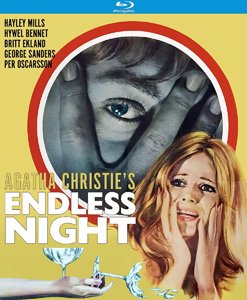As a general historical truth, Agatha Christie didn’t see a lot of great film adaptations of her work in her lifetime. What she really missed out on were crisp Poirot and Marple portrayals (the David Suchet and Joan Hickson TV series started in the decade after her death).
But she saw a few classy adaptations of her non-Poirot, non-Marple works – led by 1945’s “And Then There Were None” and 1957’s “Witness for the Prosecution.” Less talked about (but that also makes it a wonderful hidden gem) is the British production “Endless Night” (1972).
As fans of Christie’s 1967 late-career masterpiece know, this is a tricky book to adapt. (SPOILERS FOLLOW FOR THOSE WHO HAVEN’T READ THE BOOK.) The author reuses the twists from “The Murder of Roger Ackroyd” and “Death on the Nile” but they are again surprising — in a “fool me twice, shame on me” way. And they land differently, because “Endless Night” is a psychological study. “Ackroyd” and “Nile” are puzzle mysteries; “Night” is a Mary Westmacott-style romantic tragedy, up until the late-book murder technically makes it a mystery.

“Endless Night” (1972)
Director: Sidney Gilliat
Writers: Sidney Gilliat (screenplay), Agatha Christie (novel)
Stars: Hayley Mills, Hywel Bennett, Britt Ekland
Director/co-writer Sidney Gilliat starts “Night” on the plodding side, as we must get the backstory of Michael Rogers (Hywel Bennett) in more straightforward fashion than in the book. He’s still the narrator, but the film is upfront about how he’s a shiftless complainer with a pseudo-moralistic philosophy. Michael is unable to hold a job, and in film form, we see this is more obviously a case of self-sabotage rather than bad luck.
Structural marvel
When orphaned rich girl Ellie (peak cuteness Hayley Mills) falls for Michael, it’s not believable in a real-world way. But by this time Gilliat has – perhaps accidentally — achieved a surreal quality that made me think of 1973’s daylight horror classic “The Wicker Man.”
I got this vibe even before Britt Ekland (also a key tonal presence in “Wicker Man”) appears as Greta, Ellie’s closest confidante. By this time, Ellie and Michael are married and living at their newly built house at Gipsy’s Acre. Greta is immediately a strikingly beautiful presence in a vaguely troubling way.
Ellie is so adorable (in addition to being the money-holder in the relationship) that we figure Michael will never let her go. The more mature Greta immediately challenges that truism, although Michael, for his part, shows no interest in her. Gilliat and the actresses provide the equivalent vibes visually that Christie does through words.

The Gipsy’s Acre house – built on cursed land, according to the local street nut (Patience Collier) — could’ve gotten by as a straightforward expensive structure. But the set designers knock it out of the park, running wild with an aspect that Christie left undescribed. The house has to be striking in order to match with the fame of architect Santonix (Per Oscarsson, whose accent lends the right eccentric touch).
Notably, the living room features an indoor pool under a retractable floor (perhaps giving “Superman” 1978’s Lex Luthor some ideas). It would be tempting for Gilliat to bluntly show off his set designer’s work. Instead he uses the house’s oddities as metaphorical points (outsiders can’t see through the one-way windows) and for the sake of one striking tragic image.
Blessed film set on cursed land
“Endless Night’s” greatness is partly purposeful via these directing choices and the deft way Gilliat shifts from Christie’s medium to deliver the surprises in the language of cinema. Perhaps it’s also a bit accidental. I suspect the three leads pitch their performances broadly (and sometimes badly, in terms of strict craftsmanship) out of a certain amateurism at this point in their careers.
I might be wrong – maybe the performances are deliberately calibrated. But either way they are perfect for creating a vibe of daylight psychological horror and giallo-esque serial-killer-mystery (minus the buckets of blood).
Michael’s arc also has a “Psycho” vibe, which isn’t surprising considering Gilliat worked with Alfred Hitchcock. I love the reveal that Michael has been narrating not to the viewer but rather to a psych-ward doctor – a bonus, film-only surprise. As with “Psycho,” Gilliat’s film invites a rewatch once viewers know Michael’s psychopathic nature. I suspect the two big twists land with shock for viewers unfamiliar with the book.
Having read the novel, I watched for the acting choices and story execution. Yet I still got sucked into “Endless Night’s” bizarre triangle of romance, secrets and emotional instability. Then I was left with food for thought as Gilliat leaves the whodunit technically unsolved (Michael probably did it, but it could’ve been Greta, and it could’ve been a suicide). Because the murder happens so late, and because Michael’s mental state is the focus, this is a rare case where the lack of an answer is satisfying.
“Endless Night” – despite its title — is a daylight horror gem, and all the more delightful because it’s wrongly lumped in with the many failed film adaptations during Christie’s lifetime.
Sleuthing Sunday reviews an Agatha Christie book or adaptation. Click here to visit our Agatha Christie Zone.

